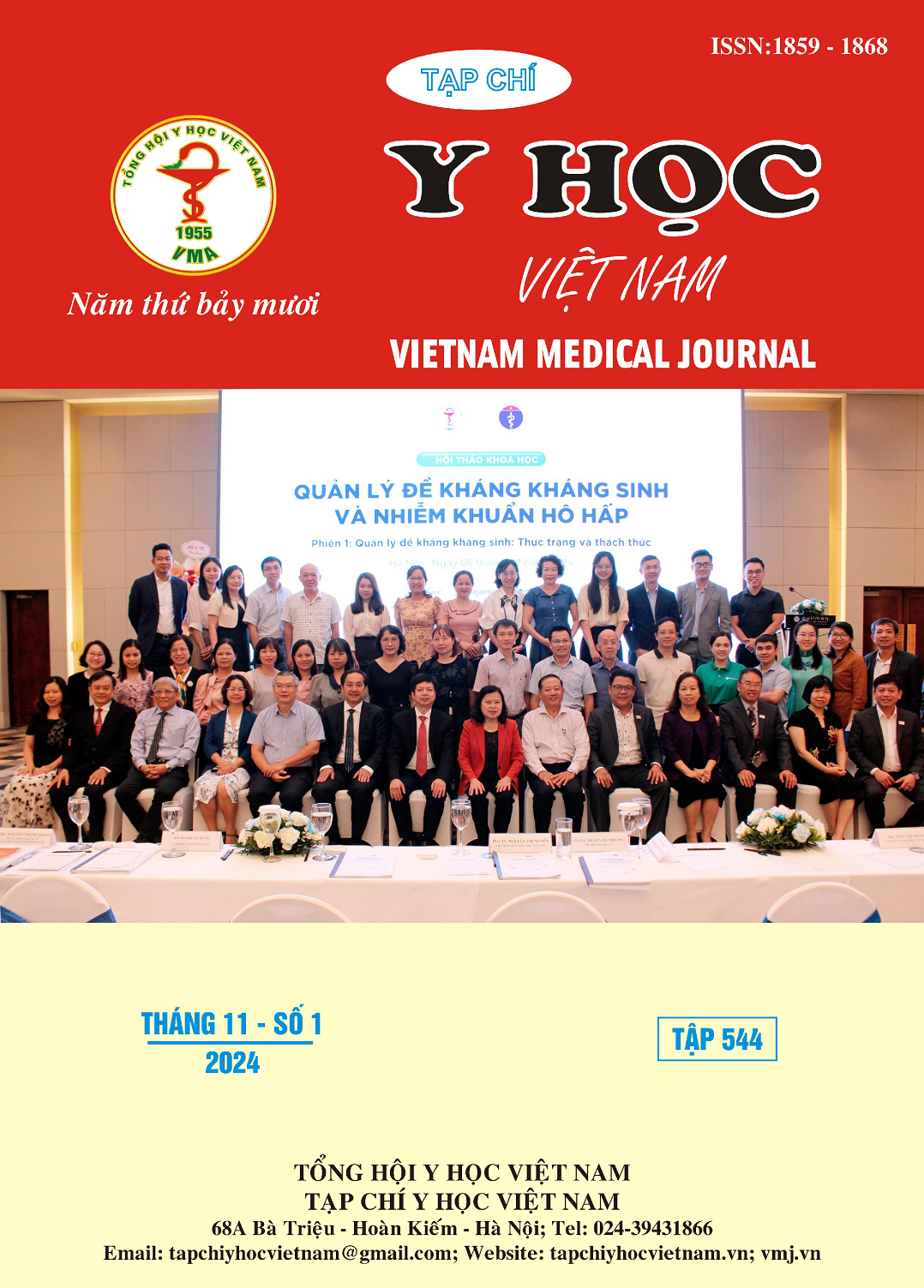HIỆU QUẢ GIẢM ĐAU CỦA PHONG BẾ CẠNH SỐNG LIÊN TỤC BẰNG CATHETER ĐẶT TRỰC TIẾP TRONG MỔ CHO PHẪU THUẬT TIM HỞ XÂM LẤN TỐI THIỂU Ở TRẺ EM
Nội dung chính của bài viết
Tóm tắt
Mục tiêu: Đánh giá kết quả giảm đau trong và sau mổ của phương pháp phong bế cạnh sống liên tục (PBCSLT) bằng catheter đặt trực tiếp trong mổ, cho bệnh nhân phẫu thuật tim hở xâm lấn tối thiểu (THXLTT) qua đường mổ nách giữa bên phải ở trẻ em. Đối tượng nghiên cứu: 30 bệnh nhi (BN) bị bệnh tim bẩm sinh được phẫu thuật THXLTT có PBCSLL trong thời gian từ T3/2022 đến T9/2022. Phương pháp nghiên cứu: Nghiên cứu mô tả, hồi cứu. Kết quả: sau khi bolus thuốc tê, có tới 23/30 (76,7%) BN không cần dùng thêm fentanyl cho tới khi kết thúc phẫu thuật. Sau phẫu thuật, có 21/30 (70%) BN không cần dùng thêm morphin trong suốt thời gian 3 ngày lưu catheter PBCSLT. Không ghi thấy BN nào có các tác dụng phụ của phương pháp phong bế thần kinh này. Kết luận: Phong bế cạnh sống liên tục qua catheter đặt trực tiếp trong mổ cho bệnh nhi phẫu thuật tim hở xâm lấn tối tiểu đạt được tác dụng giảm đau trong và sau mổ tốt, an toàn.
Chi tiết bài viết
Từ khóa
phong bế cạnh sống liên tục, tim hở xâm lấn tối thiểu, trẻ em
Tài liệu tham khảo
2. Xiao, A.; Feng, Y.; Yu, S.; Xu, C.; Chen, J.; Wang, T.; Xiao, W. General Anesthesia in Children and Long-Term Neurodevelopmental Deficits: A Systematic Review. Front. Mol. Neurosci. 2022, 15, 972025. https://doi.org/ 10.3389/fnmol.2022.972025.
3. Suresh, S.; Ecoffey, C.; Bosenberg, A.; Lonnqvist, P.-A.; De Oliveira, G. S.; De Leon Casasola, O.; De Andrés, J.; Ivani, G. The European Society of Regional Anaesthesia and Pain Therapy/American Society of Regional Anesthesia and Pain Medicine Recommendations on Local Anesthetics and Adjuvants Dosage in Pediatric Regional Anesthesia: Regional Anesthesia and Pain Medicine 2018, 1. https://doi.org/10.1097/AAP.0000000000000702.
4. De Sonnaville, E. S. V.; Oosterlaan, J.; Ghiassi, S. A.; Van Leijden, O.; Van Ewijk, H.; Knoester, H.; Van Woensel, J. B. M.; Kӧnigs, M. Long-Term Neurocognitive Outcomes after Pediatric Intensive Care: Exploring the Role of Drug Exposure. Pediatr Res 2023, 94 (2), 603–610. https://doi.org/10.1038/s41390-022-02460-7.
5. Pollak, U.; Bronicki, R. A.; Achuff, B.-J.; Checchia, P. A. Postoperative Pain Management in Pediatric Patients Undergoing Cardiac Surgery: Where Are We Heading? J Intensive Care Med 2019, 088506661987143. https://doi.org/10. 1177/0885066619871432.
6. Yeung, J. H.; Gates, S.; Naidu, B. V.; Wilson, M. J.; Gao Smith, F. Paravertebral Block versus Thoracic Epidural for Patients Undergoing Thoracotomy. Cochrane Database of Systematic Reviews 2016, 2016 (3). https://doi.org/10.1002/ 14651858.CD009121.pub2.
7. Scarfe, A. J.; Schuhmann-Hingel, S.; Duncan, J. K.; Ma, N.; Atukorale, Y. N.; Cameron, A. L. Continuous Paravertebral Block for Post-Cardiothoracic Surgery Analgesia: A Systematic Review and Meta-Analysis. Eur J Cardiothorac Surg 2016, 50 (6), 1010–1018. https://doi.org/10.1093/ejcts/ezw168.
8. Álvarez-Baena, L.; Hervías, M.; Ramos, S.; Cebrián, J.; Pita, A.; Hidalgo, I. Continuous Thoracic Paravertebral Analgesia after Minimally Invasive Atrial Septal Defect Closure Surgery in Pediatric Population: Effectiveness and Safety Analysis. Revista Española de Anestesiología y Reanimación (English Edition) 2022, 69 (5), 259–265. https://doi.org/10.1016/ j.redare. 2021.05.010.
9. Altun, D. Atrial Septal Defect Closure via Mini-Thoracotomy in Pediatric Patients: Postoperative Analgesic Effect of Intercostal Nerve Block. Turk Gogus Kalp Dama 2020, 28 (2), 257–263. https://doi.org/10.5606/tgkdc.dergisi.2020.19104.
10. Sahajanandan, R.; Varsha, A.; Kumar, Ds.; Kuppusamy, B.; Karuppiah, S.; Shukla, V.; Thankachen, R. Efficacy of Paravertebral Block in “Fast-Tracking” Pediatric Cardiac Surgery - Experiences from a Tertiary Care Center. Ann Card Anaesth 2021, 24 (1), 24. https://doi.org/10.4103/aca.ACA_83_19.


